Best AI Browser Automation Tools for E-commerce in 2025
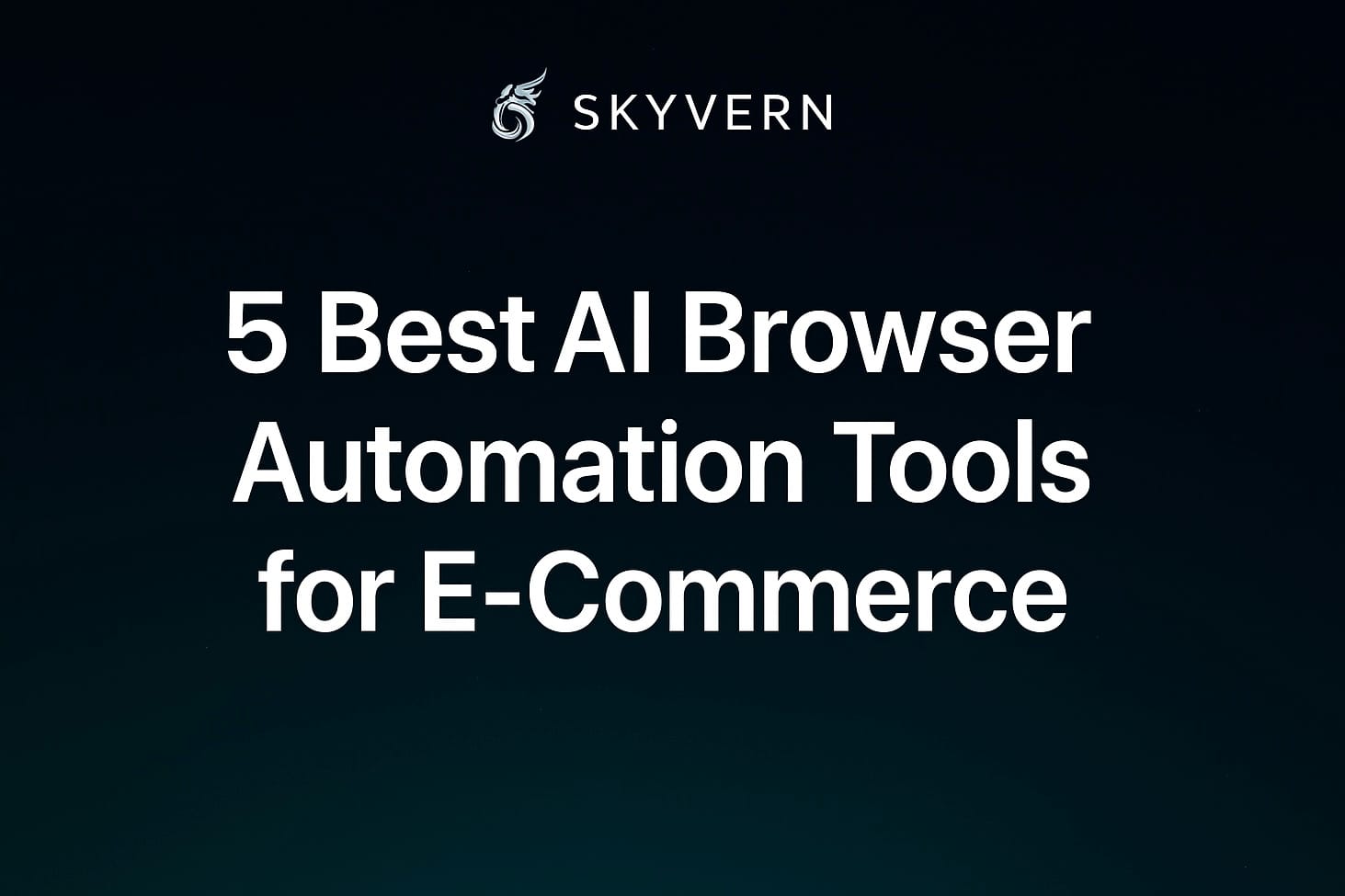
There is no end to mundane e-commerce tasks. You spend countless hours on tasks like updating product listings, processing orders, and extracting data and invoices from vendor websites. Fortunately, AI browser automation tools are here to save you as they handle these workflows intelligently, adapting to website changes without breaking like those old, rigid scripts we all remember.
The difference now is that these tools actually understand what they're looking at rather than blindly clicking predetermined buttons that stop working the moment a website updates its layout.
TLDR:
- AI browser automation tools use LLMs and computer vision to handle complex e-commerce workflows without brittle scripts
- Skyvern leads the market with 85.8% WebVoyager benchmark performance and resistance to website layout changes
- Traditional tools like Selenium require extensive coding, while modern AI solutions work out-of-the-box
- Key features for e-commerce include form filling, authentication handling, and multi-step workflow support
- AI-powered tools adapt to website changes automatically, eliminating maintenance overhead
What Are AI Browser Automation Tools
AI browser automation tools use artificial intelligence and computer vision to automatically perform web-based tasks without manual intervention. These tools fully automate manual workflows and replace brittle or unreliable scripts.
Unlike traditional automation approaches that rely on fragile XPath selectors, modern AI automation tools can operate on websites they've never seen before. They apply single workflow to multiple websites by reasoning through necessary interactions rather than following predetermined paths.
Traditional tools break when websites change their layout, AI-powered solutions like Skyvern adapt automatically. They understand context, make decisions, and handle unexpected scenarios that would crash conventional scripts.
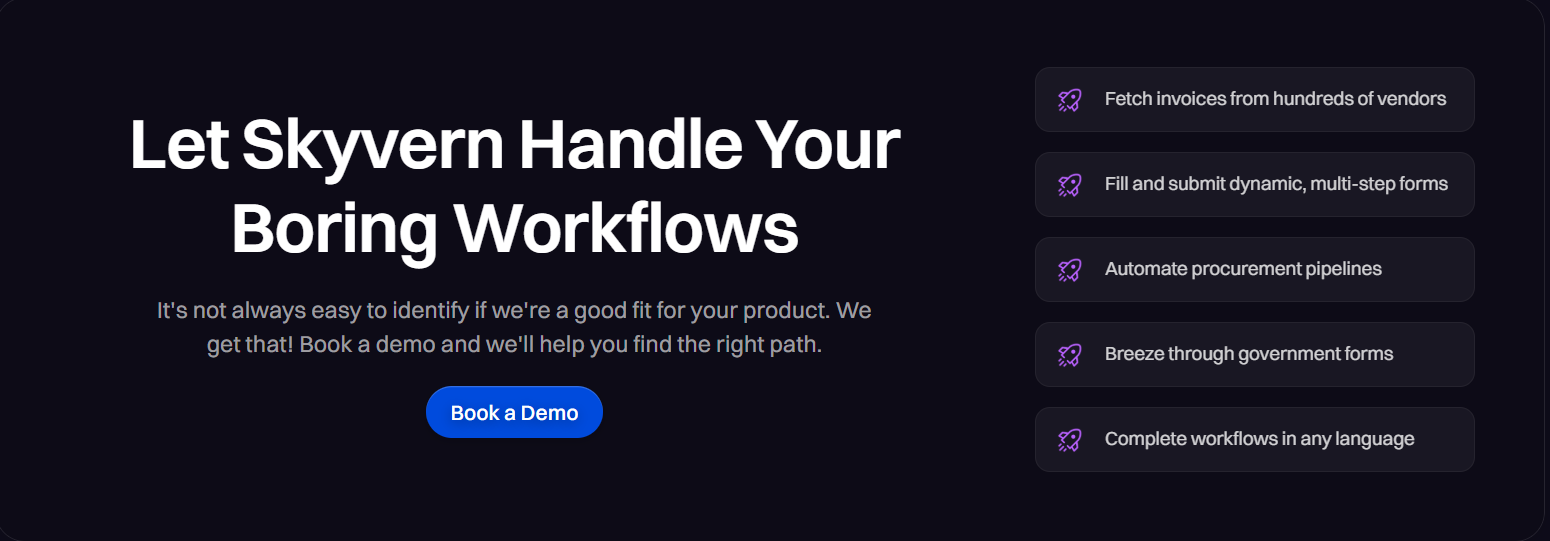
For e-commerce businesses, this means automating complex tasks like supplier onboarding, invoice processing, and inventory management across multiple platforms without constant maintenance. The best AI productivity tools are changing how businesses handle repetitive browser-based work.
How We Ranked These Tools
We assessed each tool based on AI-powered adaptability, ease of use for non-technical users, reliability across different websites, pricing value, and specific e-commerce functionality like form filling and data extraction.
We also considered:
- Performance benchmarks with tools like Skyvern achieving 85.8% on WebVoyager evaluations, which means we are best-in-class performance among all web agents.
- Support for complex workflows like authentication, file downloads, changing content, and complex reasoning.
- Practical e-commerce needs and real-world use cases like processing purchase orders, extracting product data, and handling multi-vendor workflows.
1. Best Overall: Skyvern
Skyvern automates browser-based workflows using LLMs and computer vision, providing a simple API endpoint to fully automate manual workflows. The platform can operate on websites it's never seen before and apply single workflows to large numbers of websites.
Key Strengths:
- Resistant to website layout changes with no pre-determined XPaths: The system adapts automatically when suppliers update their portals or change form layouts
- Uses LLMs to reason through complex interactions: Handles eligibility questions, product equivalents, and conditional logic without custom coding
- Native support for 2FA, CAPTCHA solving, and file downloads: Important features that many competitors lack
- Enterprise-grade proxy network with geographic targeting: Key for global e-commerce operations
The platform excels at complex e-commerce workflows like automated purchasing and form processing across multiple vendor sites. Users consistently report that Skyvern works where other solutions fail.
Bottom Line: Users report "it's the first thing that actually worked" after trying multiple automation approaches. The combination of AI reasoning and practical e-commerce features makes it a clear winner for browser automation.
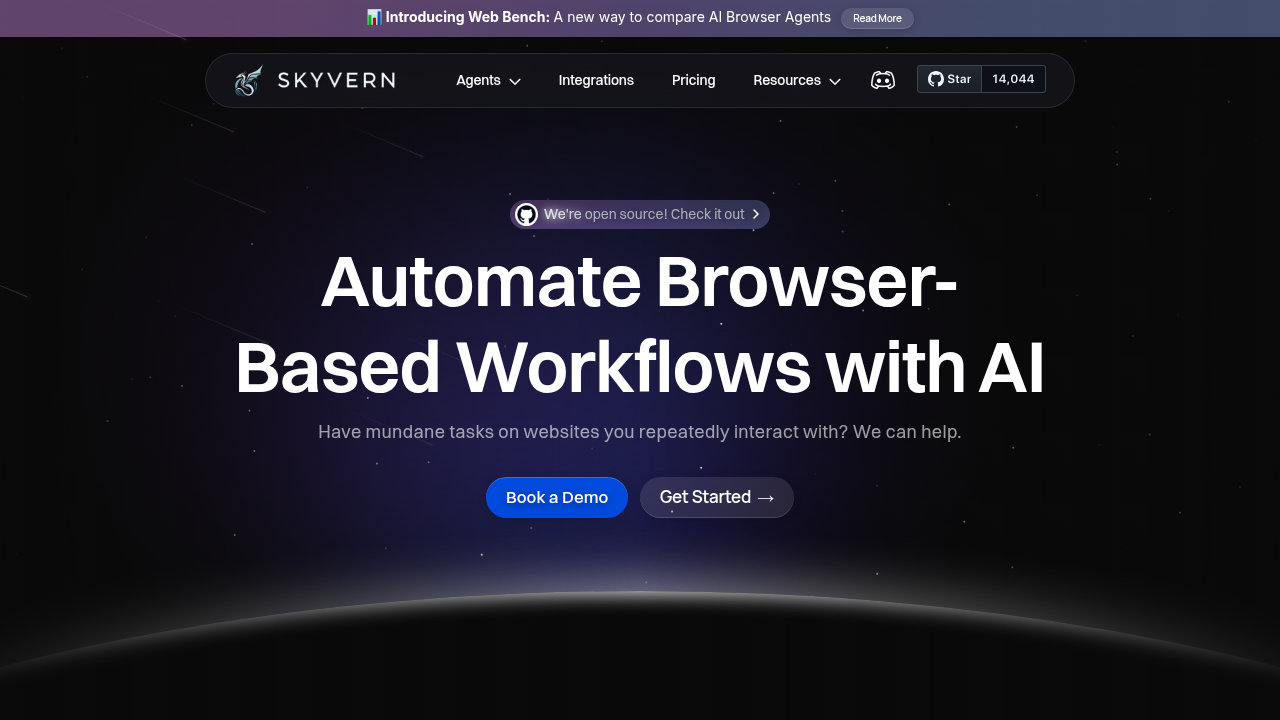
2. Code-Dependent Option: Selenium
Selenium is an open-source framework supporting multiple programming languages that has been a cornerstone of web automation since 2004. It supports a range of browsers and allows testers to write scripts in many different programming languages.
Key Strengths:
- Browser support across Chrome, Firefox, Safari, and Edge: Full compatibility for testing scenarios
- Supports major programming languages including Java, C#, Python, Ruby, and JavaScript: Flexibility for development teams
- Mature ecosystem with extensive documentation: Large community and proven best practices are documented
- Free and open-source: No licensing costs for budget-conscious teams
Constraints:
- Requires programming knowledge and extensive setup: Major barrier for non-technical users
- Brittle XPath-based selectors break with website changes: Constant maintenance overhead
- No built-in AI reasoning: Cannot handle changing scenarios or complex decision-making
Bottom Line: Best suited for teams with strong technical expertise and legacy system requirements. However, the maintenance burden makes it less practical for modern e-commerce automation compared to AI-powered alternatives.
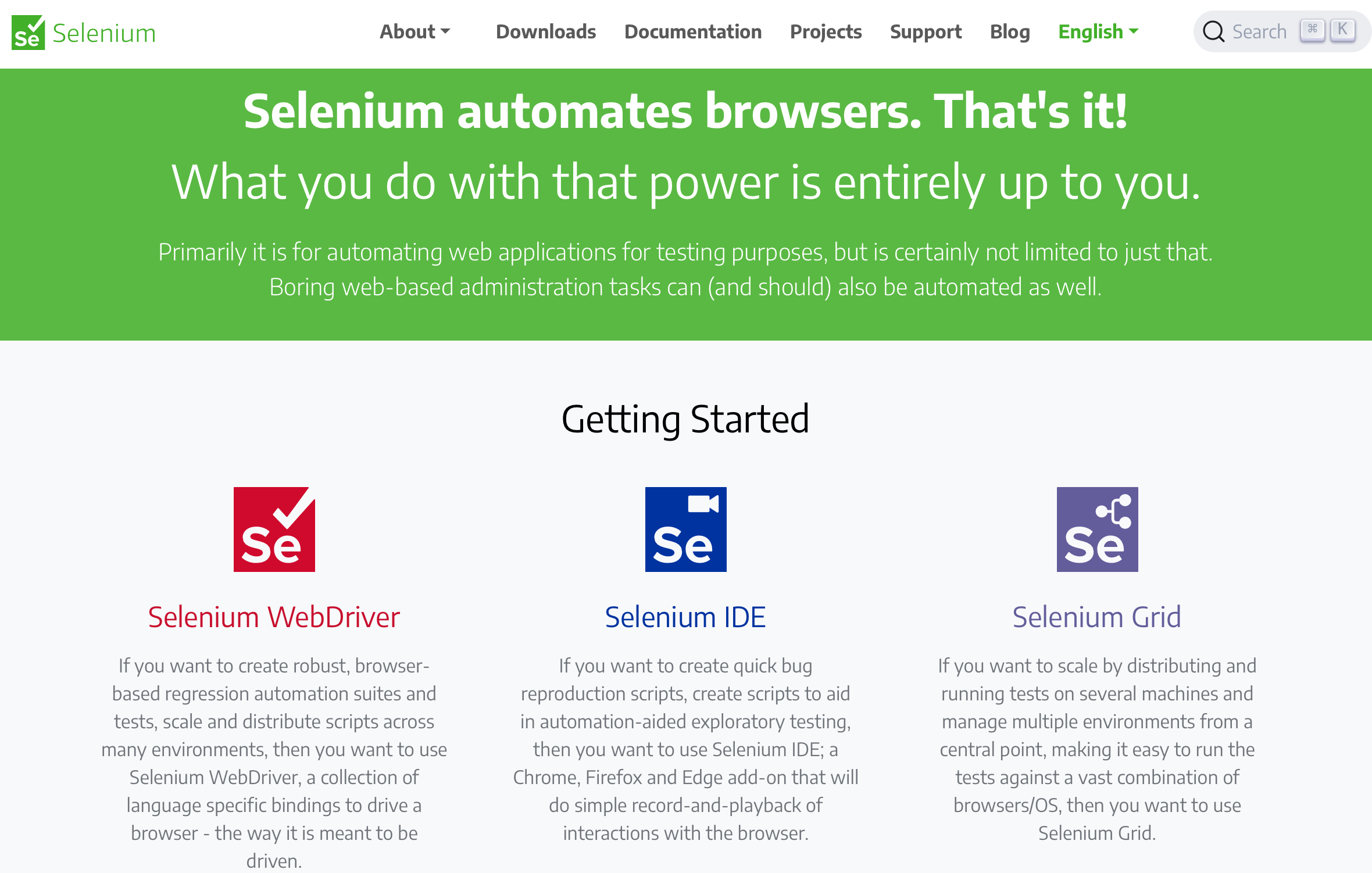
3. Speed-Limited Tool: Playwright
Playwright is a relatively new open-source tool for browser automation, released by Microsoft in 2020 and built by the team behind Puppeteer. It provides faster execution and modern features with better handling of changing web elements.
Key Strengths:
- Generally outperforms Selenium in speed due to modern architecture: Faster test execution and better resource management
- Offers automatic waiting and network interception features: More reliable handling of changing content
- Built-in support for modern web features: Better compatibility with single-page applications
- Cross-browser testing with consistent API: Unified approach across different browsers
Constraints:
- Requires Node.js proficiency and has a new community: Smaller knowledge base compared to mature tools
- Still relies on traditional selectors: Vulnerable to website layout changes like Selenium
- No AI-powered reasoning: Cannot adapt to unexpected scenarios or complex workflows
Bottom Line: Good for developers seeking faster automation but still requires a lot of technical knowledge. The lack of AI features limits its effectiveness for complex e-commerce workflows that benefit from intelligent integrations.
4. Chrome Extension-Only: Axiom
Axiom lets you build browser bots quickly without code and automate website actions on any website or web app. The tool allows users to automate UI actions like form filling with no coding required.
Key Strengths:
- Every bot can be customized and you can build as many as needed: Flexible workflow creation
- Free to try Chrome extension with simple installation: Low barrier to entry for testing
- Visual workflow builder: Intuitive interface for non-technical users
- Quick setup for basic automation tasks: Good for simple, repetitive actions
Constraints:
- Limited to Chrome browser extension: Cannot handle enterprise-scale deployments
- No advanced authentication support: Struggles with complex login scenarios
- Basic workflow features: Limited compared to enterprise automation platforms
Bottom Line: Suitable for basic Chrome-based automation but lacks enterprise scalability. For businesses needing strong e-commerce automation, solutions like Skyvern offer more complete job processing features.
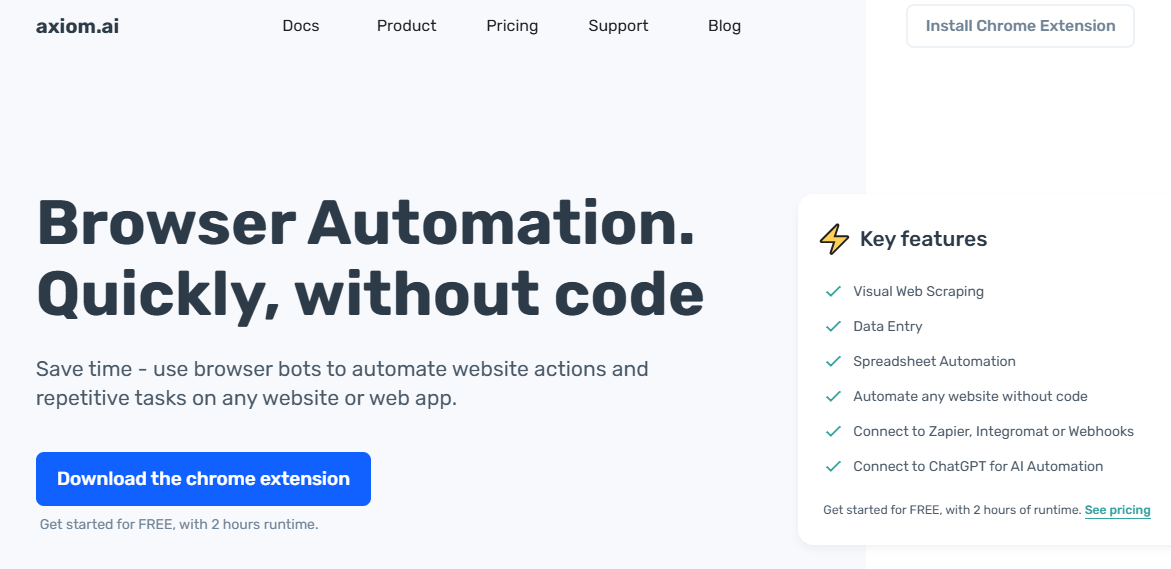
5. Research-Focused Browser: Fellou
Fellou is described as the world's first agentic browser that automates complex tasks with Deep Action technology. The platform specializes in market and product research, delivering detailed reports and insights.
Key Strengths:
- Can research top products with functions, pricing, reviews, and funding information: Complete market analysis features
- Delivers VC-style reports with trends, insights, and opportunities: Professional-grade research output
- AI-powered data: Intelligent analysis beyond simple data collection
- Specialized research workflows: Optimized for competitive intelligence and market research
Constraints:
- Primarily focused on research tasks rather than general e-commerce automation: Limited scope for day-to-day workflows
- Not designed for transactional processes: Cannot handle purchasing, form submissions, or complex business operations
- Research-specific feature set: Lacks general automation features needed for most e-commerce use cases
Bottom Line: Excellent for market research but limited for complete e-commerce workflows. Businesses needing broader automation features, including government compliance tasks, require more versatile platforms.
Feature Comparison Matrix
Feature | Skyvern | Selenium | Playwright | Axiom | Fellou |
|---|---|---|---|---|---|
No-Code Setup | ✅ | ❌ | ❌ | ✅ | ✅ |
AI-Powered | ✅ | ❌ | ❌ | ❌ | ✅ |
Cross-Browser | ✅ | ✅ | ✅ | ❌ | ✅ |
E-commerce Focus | ✅ | ❌ | ❌ | ❌ | ❌ |
Enterprise Grade | ✅ | ✅ | ✅ | ❌ | ❌ |
Layout Change Resilience | ✅ | ❌ | ❌ | ❌ | ✅ |
Complex Workflows | ✅ | ✅ | ✅ | ❌ | ❌ |
This comparison clearly shows Skyvern's advantages. Traditional tools require extensive coding and maintenance, while AI-powered solutions offer greater flexibility and reliability.
The standout difference is that layout changes don’t affect it, a critical factor for e-commerce automation, where supplier websites frequently update their interfaces. Only AI-powered tools like Skyvern handle these changes automatically.
For e-commerce businesses processing invoices or handling complex vendor interactions, the combination of enterprise features with ease of use makes Skyvern the practical choice.
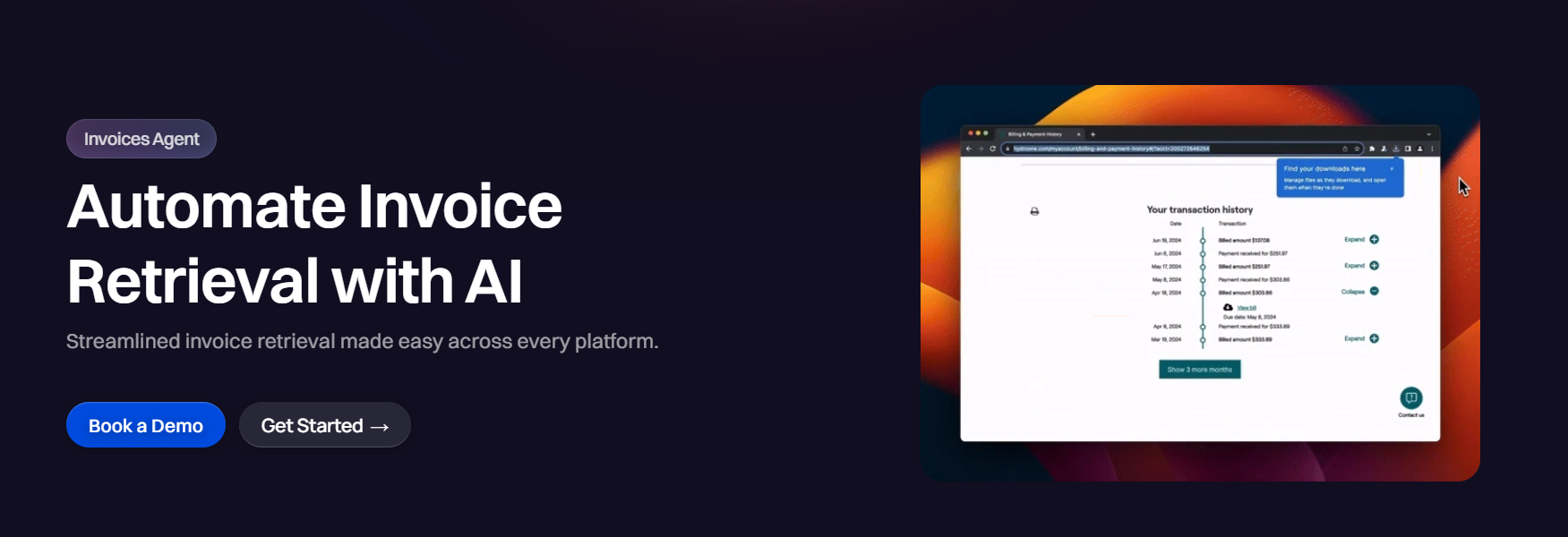
How to Choose the Right Browser Automation Tool
The decision largely depends on specific project requirements, with modern applications benefiting from faster execution and advanced features.
- Start by checking your technical expertise and team skills.
- Consider whether you need a solution that can adapt to changing websites or if you're comfortable maintaining custom scripts.
- Focus on tools that handle authentication, form filling, and multi-step workflows reliably.
- Check pricing models, support quality, and integration options with your existing systems.
If you need rapid deployment without technical overhead, AI-powered solutions offer major advantages. Tools that adapt to website changes remove the maintenance burden, freeing your team to focus on business growth rather than script debugging.
Most e-commerce businesses benefit from adaptive solutions because supplier portals and vendor sites change frequently. So choose the browser automation tool that adapts to website changes.
Consider your long-term automation goals and a solution that scales across multiple websites effortlessly. The ability to apply workflows to new vendor sites without custom development becomes valuable as your business grows.
FAQ
What makes AI browser automation different from traditional tools?
AI browser automation uses large language models and computer vision to understand web pages contextually, rather than relying on brittle XPath selectors. This means the tools can adapt to website changes automatically and reason through complex scenarios without breaking.
Can these tools handle specific e-commerce tasks?
Yes, modern AI automation tools excel at e-commerce workflows including form filling, authentication, payment processing, and multi-step checkout flows. They can handle changing pricing, inventory checks, and conditional logic that traditional tools struggle with.
Do I need programming skills to use AI browser automation tools?
Most AI-powered tools like Skyvern offer no-code interfaces and simple API endpoints. While traditional tools require programming knowledge, modern solutions focus on accessibility for business users and non-technical teams.
How reliable are these tools for business-critical processes?
Enterprise-grade AI automation tools achieve high reliability through features like proxy networks, CAPTCHA solving, and strong error handling. Skyvern, for example, maintains 85.8% success rates on complex benchmarks and includes enterprise features for mission-critical workflows.
What's the typical ROI for implementing browser automation in e-commerce?
Most businesses see ROI within months by eliminating manual data entry, reducing processing errors, and scaling operations without additional headcount. The exact ROI depends on workflow complexity and volume, but automation typically pays for itself through time savings and accuracy improvements.
Final thoughts on AI-powered browser automation for e-commerce
You can eliminate brittle scripts and manual workflows with AI-powered automation that adapts to website changes. Instead of maintaining complex code, you simply define workflows that work across multiple sites. You can achieve that with Skyvern, a modern Browser automation for e-commerce that handles authentication, forms, and data extraction automatically.

